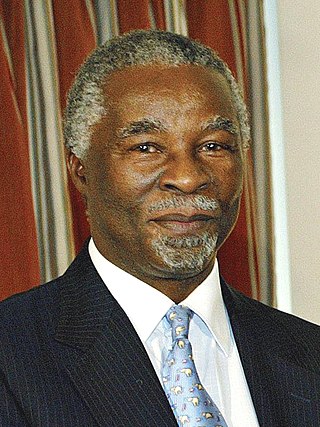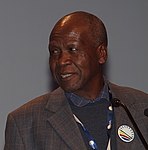
Thabo Mvuyelwa Mbeki is a South African politician who served as the 2nd democratic president of South Africa from 14 June 1999 to 24 September 2008, when he resigned at the request of his party, the African National Congress (ANC). Before that, he was deputy president under Nelson Mandela from 1994 to 1999.

Jacob Gedleyihlekisa Zuma is a South African politician who served as the fourth president of South Africa from 2009 to 2018. He is also referred to by his initials JZ and clan names Nxamalala and Msholozi. Zuma was a former anti-apartheid activist, member of uMkhonto weSizwe, and president of the African National Congress (ANC) from 2007 to 2017.

Nkosazana Clarice Dlamini-Zuma, sometimes referred to by her initials NDZ, is a South African politician, medical doctor and former anti-apartheid activist. A longstanding member of the African National Congress (ANC), she currently serves as a Chancellor of the University of Limpopo.

The National Prosecuting Authority (NPA) is the agency of the South African Government responsible for state prosecutions. Under Section 179 of the South African Constitution and the National Prosecuting Authority Act of 1998, which established the NPA in 1998, the NPA has the power to institute criminal proceedings on behalf of the state and to carry out any necessary functions incidental to institution of criminal proceedings. The NPA is accountable to Parliament, and final responsibility over it lies with the Minister of Justice and Correctional Services.

The Directorate of Special Operations (DSO), commonly known as the Scorpions, was a specialised unit of the National Prosecuting Authority of South Africa formed by President Thabo Mbeki, tasked with investigating and prosecuting high-level and priority crimes including organised crime and corruption. An independent and multidisciplinary unit with a unique methodology which combined investigation, forensic intelligence, and prosecution, the Scorpions were known as an elite unit, and were involved in several extremely high-profile investigations, especially into the Arms Deal and into high-ranking African National Congress (ANC) politicians including Jackie Selebi, Jacob Zuma, and Tony Yengeni.

Baleka Mbete is a South African politician who was the Deputy President of South Africa from September 2008 to May 2009. She was also the Speaker of the National Assembly for two non-consecutive terms from 2004 to 2008 and from 2014 to 2019. She also served as Deputy Speaker between 1996 and 2004. A member of the African National Congress (ANC), she was first elected to the National Assembly in 1994 and stepped down from her seat in 2019.

Brigitte Sylvia Mabandla is a South African politician, lawyer and former anti-apartheid activist who served in the cabinet of South Africa from 2003 to 2009, including as the Minister of Justice and Constitutional Development from 2004 to 2008. She became the South African Ambassador to Sweden in January 2020. A veteran of the African National Congress (ANC), she was an elected member of party's National Executive Committee between 1997 and 2012.
Aziz Goolam Hoosein Pahad was a South African politician and anti-apartheid activist who was Deputy Minister of Foreign Affairs from 1994 to 2008. He was a member of the National Executive Committee of the African National Congress from 1985 to 2007.

Kgalema Petrus Motlanthe is a South African politician who served as the 3rd president of South Africa from 25 September 2008 to 9 May 2009, following the resignation of Thabo Mbeki. Thereafter, he was deputy president under Jacob Zuma from 9 May 2009 to 26 May 2014.

South Africa since 1994 transitioned from the system of apartheid to one of majority rule. The election of 1994 resulted in a change in government with the African National Congress (ANC) coming to power. The ANC retained power after subsequent elections in 1999, 2004, 2009, 2014, and 2019. Children born during this period are known as the born-free generation, and those aged eighteen or older, were able to vote for the first time in 2014.

General elections were held in South Africa on 22 April 2009 to elect members of the National Assembly and provincial legislatures. These were the fourth general elections held since the end of the apartheid era.
The 52nd National Conference of the African National Congress (ANC) was held in Polokwane, Limpopo, from 16 to 20 December 2007. At the conference, Jacob Zuma and his supporters were elected to the party's top leadership and National Executive Committee (NEC), dealing a significant defeat to national President Thabo Mbeki, who had sought a third term in the ANC presidency. The conference was a precursor to the general election of 2009, which the ANC was extremely likely to win and which did indeed lead to Zuma's ascension to the presidency of South Africa. Mbeki was prohibited from serving a third term as national President but, if re-elected ANC President, could likely have leveraged that office to select his successor.
The 51st National Conference of the African National Congress (ANC) was held at the University of Stellenbosch in Stellenbosch, Western Cape, from 16 to 20 December 2002, during the ANC's 90th anniversary. President Thabo Mbeki was re-elected to the party presidency and, notably, there was no change in other five top leadership positions except for Deputy Secretary General. There was also little competition for other spots on the National Executive Committee (NEC). This ANC conference has thus been called "the quietest in its history."
The following lists events that happened during 2008 in South Africa.

The cabinet of Kgalema Motlanthe was the cabinet of the government of South Africa between 25 September 2008 and 9 May 2009. It was constituted by Motlanthe after his election on 24 September and served until after the April 2009 general election. It replaced the cabinet of former President Thabo Mbeki, who had resigned from office at the instruction of his political party.

The Congress of the People (COPE) is a South African political party formed in 2008 by former members of the African National Congress (ANC). The party was founded by former ANC members Mosiuoa Lekota, Mbhazima Shilowa and Mluleki George to contest the 2009 general election. The party was announced following a national convention held in Sandton on 1 November 2008, and was founded at a congress held in Bloemfontein on 16 December 2008. The name echoes the 1955 Congress of the People at which the Freedom Charter was adopted by the ANC and other parties, a name strongly contested by the ANC in a legal move dismissed by the Pretoria High Court.
Vusumzi "Vusi" Pikoli is a South African advocate and the former head of South Africa's National Prosecuting Authority. He is noted for instigating criminal charges against disgraced South African police commissioner Jackie Selebi and ANC president Jacob Zuma. In 2008 he was suspended from his duties by President Thabo Mbeki, a close confidant of Selebi, and then subsequently fired by Mbeki's successor, Kgalema Motlanthe, who is an ally of Zuma. As such, opposition parties and sections of the press have claimed Pikoli is the victim of two separate political conspiracies. In October 2014 Pikoli was appointed as the Western Cape's first police ombudsman by Premier Helen Zille, whose choice was unanimously backed by the provincial legislature's standing committee on community safety.
The 53rd National Conference of the African National Congress (ANC) was held in Mangaung, Free State from 16 to 20 December 2012, during the centenary of the ANC's establishment, also in Mangaung. It re-elected incumbent President Jacob Zuma and his supporters to the party's top leadership and National Executive Committee (NEC), solidly defeating an opposing group that had coalesced around presidential challenger Deputy President Kgalema Motlanthe.

Elizabeth Thabethe was a South African politician and former trade unionist from Gauteng. She represented the African National Congress (ANC) in the National Assembly of South Africa for five terms from May 1994 to May 2019. Between 2005 and 2019, she served as a deputy minister in the national governments of four successive presidents. After leaving the National Assembly, she was special investment envoy to President Cyril Ramaphosa until her death in March 2021.
Jacob Zuma, the former president of South Africa, is currently facing criminal charges relating to alleged corruption in the 1999 Arms Deal. He was first indicted on the charges in June 2005, but attempts to prosecute him have been beset by legal challenges and political controversy. He is currently charged with two counts of corruption, one count each of racketeering and money laundering, and twelve counts of fraud, all arising from his receipt of 783 payments which the state alleges were bribes from businessman Schabir Shaik and French arms company Thales.












